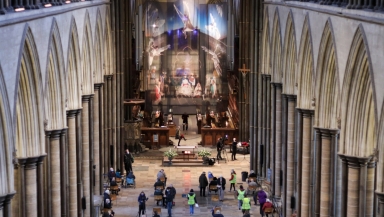
A new report has shed light on the impressive contribution of England's 42 Anglican cathedrals, but also reveals a challenging time ahead after setbacks and losses during the pandemic.
The report, by the Association of English Cathedrals, found that in 2019, they contributed £235m to their local economies, employing 6,065 people and welcoming 9.5 million tourists.
A further 308,000 visits were from schoolchildren for educational events.
Over the course of the year, the cathedrals hosted 9,580 arts, music, heritage and cultural events.
They also served as filming locations for movies and TV shows like The Crown, Doctor Who and Avengers:Endgame.
Their social contribution extended to foodbanks, support groups for the unemployed and homeless, outreach in schools and residential homes, parent and toddler groups, lunch clubs and community cafes.
The Bishop of Bristol, Viv Faull, the Church of England's lead Bishop for cathedrals and church buildings, said: "This report comprehensively demonstrates the value and importance of our nation's cathedrals, not only to those who worship in them but to their whole community.
"They are beacons in their cities and counties, at the heart of our civic life, centres for arts and heritage and bringing increasing numbers to faith."
But the report also reveals the dramatic impact of Covid-19, with last year's visitor numbers down 75 per cent on 2019 and over 70 per cent of cathedral staff furloughed.
The upheaval has been detrimental to the income of cathedrals, particularly those that are dependent on visitors.
But this is not the only source of income that has fallen, with non-visitor income from the hiring of cathedral facilities falling by 80 per cent.
The pandemic also saw a decrease in attendance due to closures and Covid-restrictions, with average adult attendance at midweek services falling from 362 adults before Covid-19 to 84 during the pandemic.
This has led to a corresponding drop in congregational giving, the report said.
But the pandemic has also brought fresh creative opportunities, with new services being launched, including food deliveries, shopping services, online pastoral support, and other internet-based initiatives like pilgrim trails, tours, exhibitions, candle lighting and prayer walls.
"While the pre-Covid growth in many areas indicated in this report is very encouraging, the report also highlights the significant losses and cutbacks that have been necessary to meet the challenges of the past year," Bishop Faull continued.
"Cathedrals are not alone in the challenges faced, however this is a timely reminder of all they offer which justifies the support they have already received, for which we are grateful.
"It is imperative this support continues to help cathedrals to grow back and to develop all they offer to their communities and economies."
The Very Rev Adrian Dorber, chair of the Association of English Cathedrals, said the cathedrals were rising to the challenge of the post-pandemic world.
"Cathedrals stand at the heart of their communities and regions – places of faith and worship, welcome and service, wonder and education. By our welcoming and inclusive ethos, millions are drawn to our cathedrals every year. It is touching to receive so much public attention and endorsement.
"We have, though, been badly affected by the pandemic; the data proves that very clearly.
"But we've risen to new challenges. We've gone digital, streamed our services, and reached out to provide practical and spiritual care to be beacons of hope in tough times."













